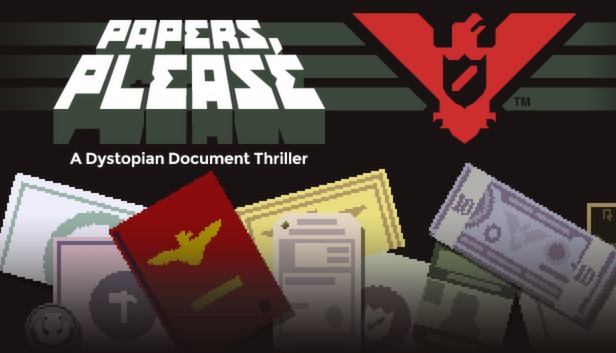Papers, Please is a puzzle simulation video game created by indie game developer Lucas Pope, developed and published through his production company, 3909 LLC. The game was released on August 8, 2013, for Microsoft Windows and OS X, for Linux on February 12, 2014, and for iOS on December 12, 2014. A port for the PlayStation Vita was announced in August 2014, and was then released on December 12, 2017. A new port for iOS as well as for Android was released in August 2022. Wikipedia

Research exclusive to this game
Formosa, Paul, Malcolm Ryan, and Dan Staines. “Papers, Please and the systemic approach to engaging ethical expertise in videogames.” Ethics and Information Technology 18 (2016): 211-225.
Glouftsis, Tamika. “Implicated Gaming: Choice and Complicity in Ludic Holocaust Memory.” History and Theory 61, no. 4 (2022): 134-151.
Kafer, Gary. “Gaming Borders: The Rhetorics of Gamification and National Belonging in Papers, Please.” American Literature 94, no. 1 (2022): 181-209.
Kelly, Matthew. “The game of politics: Examining the role of work, play, and subjectivity formation in papers, please.” Games and Culture 13, no. 5 (2018): 459-478.
McKernan, Brian. “Digital texts and moral questions about immigration: Papers, please and the capacity for a video game to stimulate sociopolitical discussion.” Games and Culture 16, no. 4 (2021): 383-406.
Morrissette, Jess. “Glory to Arstotzka: Morality, rationality, and the iron cage of bureaucracy in Papers, Please.” Game Studies 17, no. 1 (2017).
Peña, Jorge, Juan Francisco Hernández Pérez, Subuhi Khan, and Ángel Pablo Cano Gómez. “Game perspective-taking effects on players’ behavioral intention, attitudes, subjective norms, and self-efficacy to help immigrants: the case of “papers, please”.” Cyberpsychology, Behavior, and Social Networking 21, no. 11 (2018): 687-693.
Research that includes this game in its sample
Çavuşoğlu, Simay Gizem, and Güven Çatak. “Exploring Experiential Spaces in Video Games: Case Studies of Papers, Please, Beholder, and Mirror’s Edge.” Game User Experience And Player-Centered Design (2020): 409-434.
Gowler, Chad Phoenix Rose, and Ioanna Iacovides. “” Horror, guilt and shame”–Uncomfortable Experiences in Digital Games.” In Proceedings of the annual symposium on computer-human interaction in play, pp. 325-337. 2019.
Hanussek, Benjamin. “Playing distressed art: Adorno’s aesthetic theory in game design.” Replay. The Polish Journal of Game Studies 8, no. 1 (2021): 73-87.
Kagen, Melissa. “Glory to Trumpland! Critically Playing Border Games.” gamevironments 11 (2019): 23-64.
Rizvi, Zahra. “Exploring Dystopic Spatialities of Game (re) play: A Study of Papers, Please and Orwell.” In Globalization and Planetary Ethics, pp. 93-104. Routledge India.